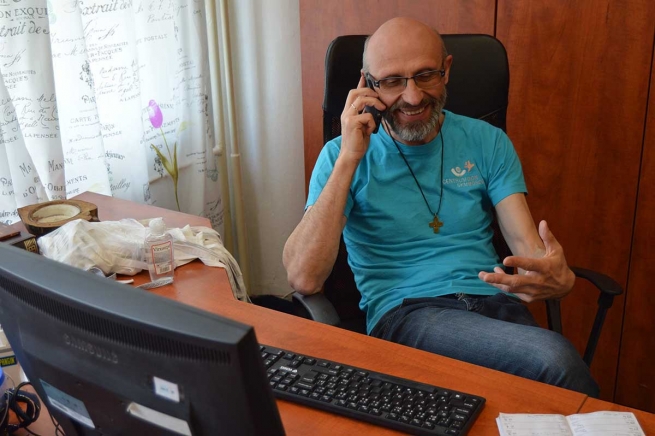“The current crisis,” he goes on, “also influenced the team of the Center Don Bosco. They work from home and communicate through videoconference. During one call one of my colleagues said: ‘I have to admit that I miss you. Those online calls are not the same.’ That was a pleasant surprise. I realised that despite our flaws, we love and miss each other. Now we are happy to see each other at least through the videoconference and talk or do long-distance praying. This situation did create something good. Something we wouldn’t have experienced if it wasn’t for the COVID-19 epidemic.”
Due to the COVID-19 crisis, the Government of Czech Republic issued an extraordinary regulation: since the March 11th, all schools and Salesian Youth Centers are closed; free movement is prohibited since March 16th (except for work and necessary things like grocery and medicine shopping or visiting a doctor); since March 19th, all people in public spaces have to wear face masks or cover their respiratory tract otherwise.
The Salesian Youth Centre provides social services and support even during the times of this crisis. Their employees work with clients from home and communicate through cell phones, e-mails, Facebook and so on. They are in contact with approximately 80 clients. Ms Anežka Jeníková is the leader of direct work and coordinates social workers of the Salesian Youth Center. With her colleagues, she helps youngsters in institutional care and foster care to start an independent grown-up life and find their place in society. Normally their contact is personal and long-distance but these days the personal contact isn’t possible.
“Our ways of helping and supporting youngsters have changed a lot. We are trying to keep as much long-distance contact as possible and we discuss the current situation with them. We ask them what it means for them and what impact does it have on their lives,” says Anežka Jeníková and adds: “We are building a relationship of cooperation and trust with them on a long-term basis. We are offering them a long-term accompaniment on their way to an independent life and also afterwards. The current situation is also part of life. They are young people who often don’t have a safe and supporting environment. And we are here to provide it. There are many ways of communication these days which allow us to work on a long-distance basis and our youngsters now need encouragement and practical help more than ever.”
Ms Anežka Jeníková explains with what things she helps the youngsters: “With some clients, we discuss a fear of the uncertainty, future and whether life will ever come back to normal. (…) I also have older clients, like mothers with whom I discuss what to do with their kids when they live in the city center and right next to their house is a playground but kids can only watch it from the window because the police would send them away. It’s just those everyday practical things that we are wondering about seeking other options.”
Anežka Jenížková also says what opportunities she sees in this crisis: “The current situation reminds me that even in these conditions we are able to keep the connection with youngsters and be their anchor. It also provides an opportunity to open topics from other parts of life. Besides the human support and practical help, in some of the conversations, we also discuss topics like the meaning of life and its finiteness. That is very valuable because under normal circumstances we wouldn’t really get to topics like this.”
Fr Čunek, SDB, currently communicates with the youngsters via cell phone, e-mail, chat and extraordinarily also in person, when they urgently need food, material or social aid. The Youth Center determined several sanitary measures, thanks to which, under special circumstances, it's possible. Clients in institutional care have trouble with managing their school responsibilities or boredom and isolation. On the other hand, those who already live independently face fear, loss of income, work or loneliness. “The long-distance contact is necessary. Without it, we would lose connection with the clients. Nowadays I feel the need to write and call them more than ever.”


